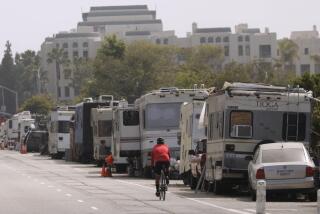Residents Riled by Trailer Park Building Limits
SEAL BEACH — All they want is a little less red tape to make a few improvements on their homes.
For more than a decade, Seal Beach Trailer Park residents have looked for ways to make their compact, ground-level mobile homes more spacious.
But despite pleas from a majority of the park’s 125 families to amend building codes, city officials have refused to allow changes.
Reasoning that more living space means more people, more traffic and an increased fire hazard, the City Council voted unanimously last week to keep in place the city’s 14-year-old ban against adding second stories to mobile homes that sit less than 20 feet from already expanded trailers.
That’s not sitting well with park residents, who vow to fight and are talking about legal action.
“It’s prejudice against us poor people, and it’s unfair,” said John McKee, 57, a resident at the seaside trailer park in this largely affluent city.
What further riles residents is that while state law permits people in the park to add second stories to their trailers, the city code has served to restrict how many trailers can be enlarged. For instance, a trailer owner whose immediate neighbors add second stories is effectively barred from following suit because of the city rule requiring 20 feet between two-story structures.
That restriction has produced a first-come, first-served policy, residents say, pitting neighbor against neighbor in a race to enlarge their trailers.
The result: a trailer park where looming Tudor-style and townhouse look-alike mobile homes, some complete with stone fireplaces and ocean-view sun decks, stand side-by-side with tiny, aging travel trailers.
The city could remedy this inequity by changing the code and eliminating the 20-foot rule, thus allowing everyone the same right to expand, residents point out. Council members say they will stand behind their decision.
“The current council is not likely to change its mind,” Councilman George Brown said. “They can take it to court if they like, but we don’t think we’ll be on the losing end.”
Brown said that although the mobile home owners have legitimate arguments, public safety is at the heart of the matter. City building standards require two-story structures at the park to be at least 20 feet apart to reduce the risk of spreading fires.
Park tenants believe that the public safety argument is just a smoke screen to keep the park’s population low. In fact, they say, fire officials have supported the notion of second-story additions, with a few conditions: installing interior sprinklers and having stucco exteriors. But Fire Department officials also have said the city has the final say on whether trailers can be expanded.
Meanwhile, some trailers have grown taller and grander, aided by the “cabana rule,” a 1983 state law applying specifically to this park. It allows tenants to build homes as tall as two stories around their trailers, even entirely encasing them, but only if they don’t add a kitchen. Without a kitchen, the added structure legally is considered a cabana.
Those cabanas were built with city permits and are legal because at least 20 feet remains between them and the nearest structures. But the system has led to what residents term a less-than-democratic method for building within the park, which now boasts 23 cabanas.
So the resident coalition wants to eliminate what they view as an arbitrary city code that has made feuding between neighbors commonplace.
“All we want is a uniform code where it doesn’t turn into the Hatfields and the McCoys out here,” said Ken Williams, 40, a Seal Beach resident for 32 years and 10-year park resident.
*
Park residents have tried to sway the opinion of Mayor Gwen Forsythe, who represents the district encircling the park, but to no avail. Forsythe, who made the motion to deny the residents’ request, could not be reached for comment last week.
“It’s discrimination against trailer park individuals, because we don’t have the same building rights as the rest of the city’s residents,” Williams said. “They are treating us like trailer trash, and we’re not going to stand for that.”
During last week’s meeting, however, Forsythe denied the city was discriminating against the trailer park, saying it has only as many unique codes as any other neighborhood in the city.
The City Council plans to form a citizens group to study the neighborhood’s remodeling options. But McKee and neighbors say they’ve waited long enough.
A coalition representing a majority of the park is pulling together to hire an attorney to determine where they stand legally. “We were nice, and now we are going to play hardball,” McKee said.
More to Read
Sign up for Essential California
The most important California stories and recommendations in your inbox every morning.
You may occasionally receive promotional content from the Los Angeles Times.










